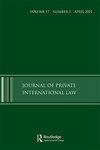Choice of court agreements and derogation from competition law
IF 0.3
Q3 LAW
引用次数: 0
Abstract
Japanese courts have held that a choice of court agreement should be respected even if it would lead to derogation from domestic competition law. The exception is where there would be such a discrepancy between the outcomes before the designated foreign court and the Japanese courts that it would be intolerable to enforce the agreement from the standpoint of maintaining the public policy objectives of Japanese competition law. However, this paper puts forward an alternative approach as the more appropriate course to take, submitting that choice of court agreements should generally be respected by courts in competition law claim situations, unless they are obviously unreasonable or contrary to public policy on their face. At the jurisdictional stage, a court should not treat an agreement as invalid merely because it could potentially lead to a derogation from domestic competition law, even where such law is regarded as a body of overriding mandatory rules.法院协议的选择和竞争法的减损
日本法院认为,法院选择协议应得到尊重,即使这会导致对国内竞争法的减损。例外情况是,指定外国法院和日本法院的裁决结果存在差异,从维护日本竞争法公共政策目标的角度来看,执行协议是不可容忍的。然而,本文提出了另一种方法作为更合适的做法,认为法院在竞争法索赔情况下通常应尊重法院选择协议,除非这些协议表面上明显不合理或违反公共政策。在管辖权阶段,法院不应仅仅因为协议可能导致对国内竞争法的减损而将其视为无效,即使国内竞争法被视为一套凌驾于强制性规则之上的法律。
本文章由计算机程序翻译,如有差异,请以英文原文为准。
求助全文
约1分钟内获得全文
求助全文

 求助内容:
求助内容: 应助结果提醒方式:
应助结果提醒方式:


